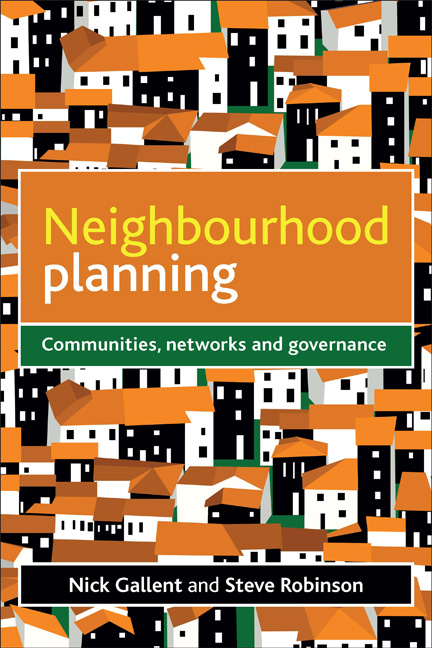Book contents
- Frontmatter
- Dedication
- Contents
- List of figures, images and table
- Abbreviations
- Acknowledgements
- Authors’ note
- Part One Democracy, planning and localism
- Part Two Capacity building and community-based planning
- Part Three The interface with policy actors
- Part Four Neighbourhood planning, leadership and democratic renewal
- References
- Index
three - Localism and its antecedents
Published online by Cambridge University Press: 07 September 2022
- Frontmatter
- Dedication
- Contents
- List of figures, images and table
- Abbreviations
- Acknowledgements
- Authors’ note
- Part One Democracy, planning and localism
- Part Two Capacity building and community-based planning
- Part Three The interface with policy actors
- Part Four Neighbourhood planning, leadership and democratic renewal
- References
- Index
Summary
The ‘localism’ of the UK coalition government is rooted in some of the ideas introduced in the last chapter. It connects with a participatory and collaborative (or ‘iterative’) understanding of how the structures of governance should function (Corry and Stoker, 2002; Stoker, 2004, 2007) and, like other collaborative approaches that operate at the interface with ‘communities of interest’, is viewed as an antithesis to centralised control, exerted through executive decision-making structures. With individualisation and globalisation as its backdrop, it is presented as the means to achieve democratic renewal and to rebuild trust between policy communities and communities of interest. Local control over service delivery and community input into policy making seem to have an obvious meaning, and these are not new ideas. In the mid-2000s, Labour's programme of local government modernisation was frequently described as a form of ‘new localism’ (Davies, 2008, p 3). And during that period, others regularly noted the turn towards localism that appeared inherent in UK public policy (see Morphet, 2004a; Coaffee and Headlam, 2008). Localism is not new, but has deep roots in state theory and particularly in those discourses that focus on the relationship between local and central government and the extent to which the former can be freed from centralised control while still working to secure success in big government initiatives and programmes, in pursuit of a wider public good. However, use of the term is often couched in political rhetoric and conceptual uncertainty. Like other misused terms, ‘sustainability’ being the most obvious example, it can mean different things to different audiences. The purpose of this chapter is to clarify the origins of localism, to review the part it looks set to play in the coalition's ‘Big Society’ and then to focus on its ‘neighbourhood planning’ component and how this, framed by the broader ambition of localism, has become government's chosen mode of iterative governance and democratic renewal.
The centre and the local
Localism seeks a revision of the relationship between central state and governance structures at the local level, with a view to coping with the increasing diversity of individual and community needs and aspirations.
- Type
- Chapter
- Information
- Neighbourhood PlanningCommunities, Networks and Governance, pp. 23 - 36Publisher: Bristol University PressPrint publication year: 2012



